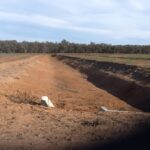Australia’s water rights reform caused problems for farmers
At the peak of Australia’s Millennial drought, lawmakers sought to resolve water shortages by overturning their historic water rights system with the 2007 Water Reform Act and put water management into the hands of their federal government. Nearly a decade on, the Act and subsequent Murray-Darling Basin Plan have led to fallowed farmland, unemployed farmworkers and struggling businesses in rural communities—the same problems California’s Central Valley is already facing. Australia’s drought solutions are no answer for California
California lawmakers seek solutions to the drought
As California lawmakers spend time in Australia on a fact-finding mission to help combat our own multi-year drought, they need to be aware that the adoption of Aussie-type reforms may only make California’s water supply situation worse, at least for our state’s food producers. Those participating in the tour include Democratic Senate President Pro Tem Kevin de León of Los Angeles, Assembly Minority Leader Kristin Olsen of Modesto and Assembly Member Marc Levine of San Rafael.
Australia’s attempt to resolve many of its own water supply issues are creating the same scenarios that already exist in the parched Central Valley – unemployment and the economic ripples that affect farm jobs and the businesses that depend on them.
 Under the 2007 Water Reform Act water management shifted from the States to the federal government. As an excuse for a national water management plan, then-Prime Minister John Howard said, “The old ways of managing the (Murray-Darling) Basin have reached their used-by-date.”
Under the 2007 Water Reform Act water management shifted from the States to the federal government. As an excuse for a national water management plan, then-Prime Minister John Howard said, “The old ways of managing the (Murray-Darling) Basin have reached their used-by-date.”
Sound familiar? How many times have we heard that California’s “antiquated system of water rights” is overdue for change. The trouble with change is…things change. In Australia, farmers ended up with less water. According to Australian Broadcasting Corporation (ABC) news reports, community impacts have been severe. The community of St. George lost over 42,000 ace-feet of water with no socio-impact assessments to determine how the community would be affected.
Aussie communities lost water to outside sales
The changes in water rights and subsequent transfers have caused vast quantities of irrigation water to be sold out from under local communities with devastating effects. Mayor Donna Stewart of Balonne Shire said in an ABC news report that water sales authorized by water rights reform act have had the effect of creating a permanent drought in rural communities.
Sounds a lot like Firebaugh, East Porterville, Mendota, and other Valley communities.
According to Stefanie Schulte, Policy Manager at the New South Wales Irrigators’ Council, what started out as a 10-point plan and US$8 billion investment, “has transformed into a complex and confusing framework that often does not achieve its “environmental” objectives but leaves farmers and rural communities with significantly less productive water to grow food and fiber.”
California needs grassroots solutions that protect farms and our food supply
If California politicians seeking answers in Australia bring anything back with them it should be a better understanding that solutions must come from the bottom up and include farmers and the rural communities. Wholesale changes to California’s water rights system is the wrong way go about solving our water crisis. Simply rearranging the water rights we currently have will undoubtedly create winners and losers, just like it did in Australia.
That is bad news for the farmers who grow our food and in the long run, for the families who want to buy California’s fresh bounty at the grocery store.




